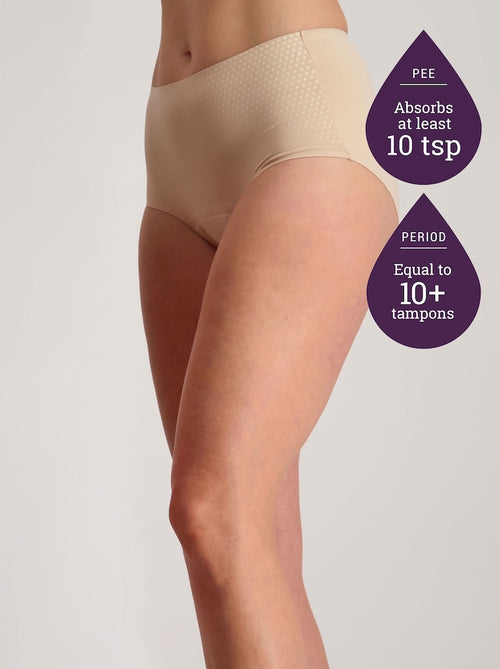It seems to make sense that restricting your intake of fluids would reduce the occurrence of
bladder leakage.
But does it? Well no, and maybe yes, because it all depends what kind of fluids you’re talking about.
Firstly, and most importantly, don’t stop drinking water! Despite popular opinion, drinking less water isn’t going to lessen bladder leakage. Because your body needs water to function at an optimum level, dehydration can irritate the bladder and make you pass urine even more frequently – so keep up the water intake. How much do you need to drink in a day? The best guide is to drink when you feel thirsty. You can also look at the colour of your urine – if it’s a pale yellow colour you're probably drinking enough water. If it’s darker you may need to up your intake. Having small drinks throughout the day may help lessen the pressure on your bladder, and if you often need to get up in the night to pee, you may be best to drink more in the morning and less in the evening.
However, some other common drinks are known to irritate the bladder and stimulate bladder leakage.
Coffee and tea
It’s the caffeine in coffee and tea that can make you need to pee more often and more urgently. Caffeine has a diuretic effect, which means it increases the amount of urine your body makes, and it may also irritate the bladder lining and affect the muscles that control urination. Studies have shown that people who consume high levels of caffeine are more likely to experience urinary incontinence than those who don’t. So experiment with decaf coffee and herbal or decaffeinated teas – there are some really good ones around but check the pack as some contain low levels of caffeine.
Fizzy drinks
The fizz in carbonated drinks such as soft drinks and soda water can aggravate the bladder and lead to leakage. Energy drinks and colas that combine carbonation and caffeine are even more risky, as is champagne, which combines carbonation and another bladder stimulant, alcohol.
Citrus and cranberry juices
The acid in some fruits, such as oranges, lemons, grapefruit, limes and cranberries, can irritate the bladder and make it harder for people with urge incontinence to control the urge to pee.
Alcohol
Alcohol is a diuretic, meaning that it stimulates urine production and can increase the urge to pee, leading to bladder leaks. But what makes it more dangerous is that it also relaxes the muscles that control the bladder, giving you less control. Plus getting drunk messes with the signals your bladder sends to your brain, so your awareness of when and how urgently you need to go may be affected.
If you suspect a certain drink might be making you leak, stop drinking it for a while and pay attention to any changes in your body and your bathroom routine. If nothing changes, slowly add small amounts back in. We’ve created a handy bathroom diary to help you keep track – you can download it for free here.
Cutting down on coffee, alcohol and fizzy drinks is a smart move for everyone, whether or not you experience bladder leakage as a result. So making this positive change will improve not just your
bladder control,
but how you feel in general!







